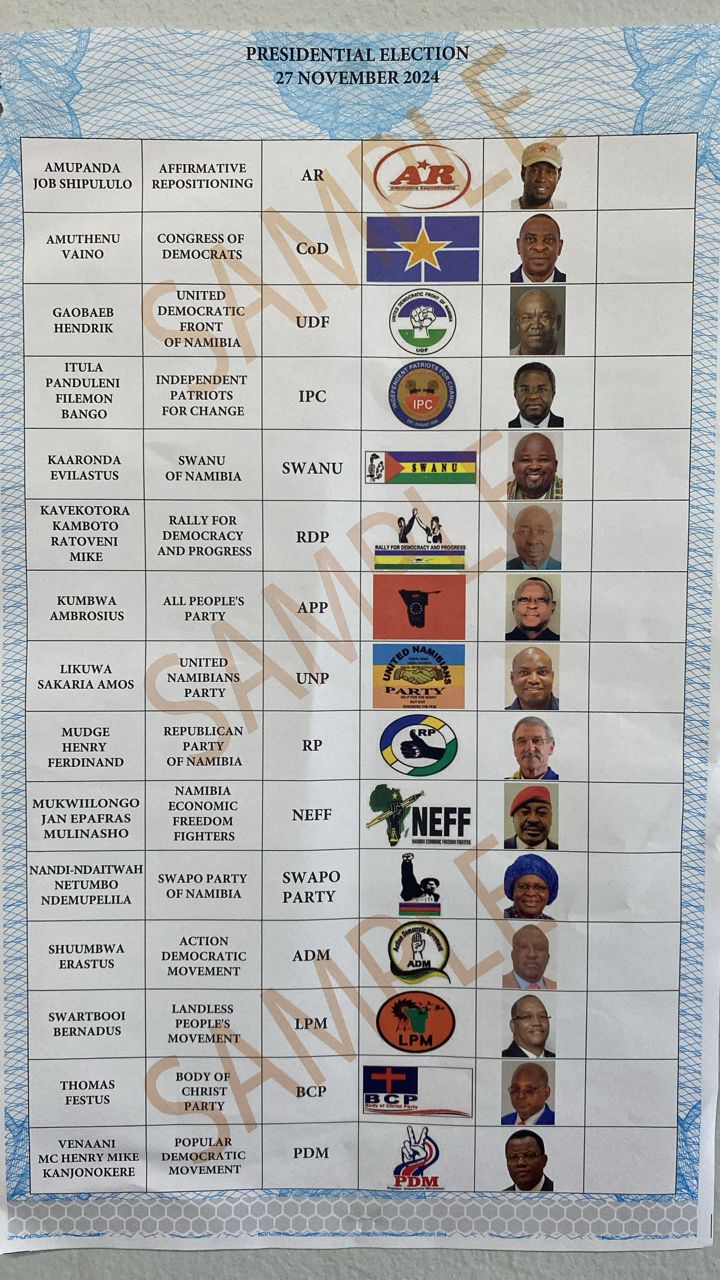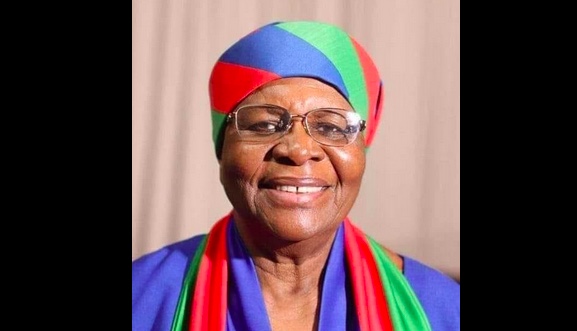A HANDWRITTEN change to the date for delivery of 2 500 Omuthiya ballots – to the same day on which quotations for printing the ballots were to be submitted to the Electoral Commission of Namibia – “was just a slip of the pen”.
It did not imply any sinister motives, ECN technical services director Floris Farmer said yesterday. However, it did limit the number of companies which could quote for the job.Initially an advert in the Tender Bulletin of February 12 called for quotations for the printing of the 2 500 Omuthiya ballots – to be submitted by 12h00 on February 18.The ECN documentation, which lists the specific security requirements such as a specific kind of security paper, binding, numbering and design, originally listed the date for delivery of the ballots to the ECN offices as February 26.However, this date was then crossed out and changed to February 18 – the same date on which the quotations had to be submitted.Farmer acknowledged that he had signed this change, but said it “was just a slip of the pen” and should not be seen as anything other than an honest mistake.Read in its context, this meant that whoever wanted the printing job would have had to print and deliver those on the same day as they submitted their quote – implying that whoever submitted a quote would have had assurances in advance that they would get the job.Farmer denied that this was the case, but did not explain why he had made the change in the first instance.Local printing companies have to order the special paper – which then has to be imprinted with the requisite watermarks – from South Africa, which would take at least three days to deliver.This mistake meant that only two companies – British security printer Newsman Smith with printers in Pretoria and the Swapo-owned Namprint – submitted quotations for the printing job, Farmer acknowledged.At any rate, the ballots for the Omuthiya local election would now have to be reprinted after ECN Director Philemon Kanime postponed the election late on Thursday, hours before voters were to go to the polls to elect the first Omuthiya Town Council.The ballots – amounting to 25 booklets – were in fact delivered on February 26, according to a delivery note Farmer showed to The Namibian.Although only 1 587 voters were registered on Omuthiya’s still-disputed voters’ roll, the over-print of more than 900 ballots had been to ensure that none of the nine polling stations would run out of ballots, Farmer said.The ballots were still stacked in Farmers’ office at the ECN, having now been rendered obsolete by the decision to postpone the Omuthiya election, as each ballot is imprinted with the original election date – February 29 2008.Only Swapo and the DTA verified and signed off on the Omuthiya ballots – the RDP came late for a meeting at which this was to be done, and the CoD never checked the ballots, ECN officials said.Namprint, which is owned by Swapo’s Kalahari Holdings, has in fact obtained almost all ballot printing jobs since the 1999 elections, in spite of problems experienced by opposition parties with the quality of their work, in especially the controversies surrounding the 2004 elections.Carola Engelbrecht of civil society organisation CATS (Citizens for an Accountable and Transparent Society) said that during the High Court challenge to the outcome of the 2004 elections, Namprint’s ballot books often contained 95 or 104 ballots instead of the specified 100 ballots per book.Engelbrecht, who then was still the Republican Party’s secretary general, said it had proved impossible to verify exactly how many ballots had been printed.Namprint’s virtual monopoly on ballot printing – although other printing companies allege its quotes are often three times as high as their own – is also at variance with international practice in this regard, with “arms-length” companies preferred to ones owned by one of the parties contesting the elections.In practice, this often means that ballots for national elections are printed in another country to avoid allegations of irregularities.* John Grobler is a freelance journalist; 081 240 1587However, it did limit the number of companies which could quote for the job.Initially an advert in the Tender Bulletin of February 12 called for quotations for the printing of the 2 500 Omuthiya ballots – to be submitted by 12h00 on February 18.The ECN documentation, which lists the specific security requirements such as a specific kind of security paper, binding, numbering and design, originally listed the date for delivery of the ballots to the ECN offices as February 26.However, this date was then crossed out and changed to February 18 – the same date on which the quotations had to be submitted.Farmer acknowledged that he had signed this change, but said it “was just a slip of the pen” and should not be seen as anything other than an honest mistake.Read in its context, this meant that whoever wanted the printing job would have had to print and deliver those on the same day as they submitted their quote – implying that whoever submitted a quote would have had assurances in advance that they would get the job. Farmer denied that this was the case, but did not explain why he had made the change in the first instance.Local printing companies have to order the special paper – which then has to be imprinted with the requisite watermarks – from South Africa, which would take at least three days to deliver.This mistake meant that only two companies – British security printer Newsman Smith with printers in Pretoria and the Swapo-owned Namprint – submitted quotations for the printing job, Farmer acknowledged.At any rate, the ballots for the Omuthiya local election would now have to be reprinted after ECN Director Philemon Kanime postponed the election late on Thursday, hours before voters were to go to the polls to elect the first Omuthiya Town Council.The ballots – amounting to 25 booklets – were in fact delivered on February 26, according to a delivery note Farmer showed to The Namibian.Although only 1 587 voters were registered on Omuthiya’s still-disputed voters’ roll, the over-print of more than 900 ballots had been to ensure that none of the nine polling stations would run out of ballots, Farmer said.The ballots were still stacked in Farmers’ office at the ECN, having now been rendered obsolete by the decision to postpone the Omuthiya election, as each ballot is imprinted with the original election date – February 29 2008.Only Swapo and the DTA verified and signed off on the Omuthiya ballots – the RDP came late for a meeting at which this was to be done, and the CoD never checked the ballots, ECN officials said.Namprint, which is owned by Swapo’s Kalahari Holdings, has in fact obtained almost all ballot printing jobs since the 1999 elections, in spite of problems experienced by opposition parties with the quality of their work, in especially the controversies surrounding the 2004 elections.Carola Engelbrecht of civil society organisation CATS (Citizens for an Accountable and Transparent Society) said that during the High Court challenge to the outcome of the 2004 elections, Namprint’s ballot books often contained 95 or 104 ballots instead of the specified 100 ballots per book.Engelbrecht, who then was still the Republican Party’s secretary general, said it had proved impossible to verify exactly how many ballots had been printed.Namprint’s virtual monopoly on ballot printing – although other printing companies allege its quotes are often three times as high as their own – is also at variance with international practice in this regard, with “arms-length” companies preferred to ones owned by one of the parties contesting the elections.In practice, this often means that ballots for national elections are printed in another country to avoid allegations of irregularities.* John Grobler is a freelance journalist; 081 240 1587
Stay informed with The Namibian – your source for credible journalism. Get in-depth reporting and opinions for
only N$85 a month. Invest in journalism, invest in democracy –
Subscribe Now!






